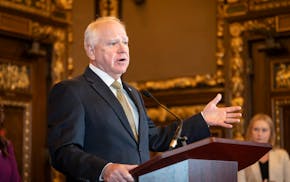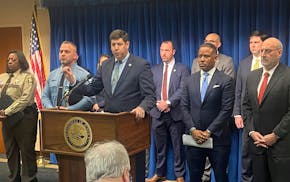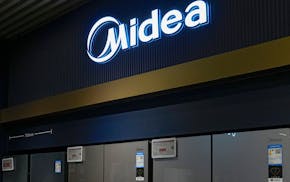DFL Rep. Angie Craig rode the 2018 blue wave to victory and has fended off close challenges for the last three terms by appealing to a broad swath of swing voters in the Second Congressional District.
All of her races have been close, but her tightest race so far was during the 2020 presidential election when she beat GOP Tyler Kistner by just over two points. Running in a presidential election year once again will put Craig's mainstream appeal to the test and could determine whether the Second Congressional District remains one of the last swing seats in the state.
A majority of district voters have picked the winning presidential candidate each cycle since 2000. Some people describe them as independents, but Joe Atkins, a Dakota County commissioner from Inver Grove Heights, prefers "zig zaggers."
"They work their way down the ballot and vote for people depending on whether they show up on bread and butter issues" like public safety, transportation and the economy, said Atkins, a former House DFLer. "It's more about the candidate than the partisan leaning. It's trended more blue, in recent years, but a Republican can definitely win in CD2."
Craig will face off against GOP political newcomer Joe Teirab in November. He's a former assistant federal prosecutor and Marine who hopes to turn out Republicans and convince those "zig zaggers" to give the Republican candidate a fresh look. Both candidates have considerable campaign war chests and backing from national groups.
But would a fourth-term win for Craig indicate the district is trending blue? The answer is not straightforward. Political observers think the district will remain a swing seat for the foreseeable future.
"I think we could see that over the past few elections it's trending blue. It's just still so close to 50/50," said State Sen. Erin Maye Quade, DFL-Apple Valley. "It's not that long ago that we had a Republican member of Congress and some really hard-fought elections."
Craig became only the second Democrat to hold the seat since the 1940s when she beat former Rep. Jason Lewis in 2018 by over five points in a rematch. And the race between Craig and Kistner was decided by 9,580 votes and by a little over 17,000 votes in their 2022 rematch.
After Craig lost to Lewis in 2016 by fewer than 7,000 votes, she vowed to talk to more voters, not only Democrats, a strategy that appears to have paid off.
She's established a moderate brand and taken more conservative positions on issues such as immigration and law endorsement. Craig set herself apart in recent months as one of the first Democrats to call on Biden to drop out of the presidential race.
That brand is likely what's helped Craig keep the seat blue. It would be a different story if there wasn't an incumbent in the race.
"If it were an open seat, I would consider it competitive and a swing district," said David Schultz, a Hamline University professor.
Not just any Democrat can hold the seat, said Rep. Dean Phillips, who, like Craig, rode the 2018 blue wave to victory and will soon leave a congressional district that appears to have trended blue since his win.
"CD2 is one of the few remaining swing districts in America, and as such it's candidate dependent," Phillips said.
It shouldn't be too tough for Teirab to keep the race with Craig close. Political watchers note the second district is a "microcosm" of Minnesota's political makeup — it's very blue near the Twin Cities and turns redder the further south you go.
"This is the most competitive district because it best represents both blue and red Minnesota," said Steve Schier, a Carleton College political science professor.
But while that's true, Schultz says redistricting in 2020, Craig's incumbency and a growing number of moderates in the suburbs give Democrats a growing advantage.
Local GOP stays out
Political observers say the local GOP party's inability to coalesce behind Teirab could hurt him. He easily prevailed in the August primary, largely because the grassroots and local party-insider's favorite Tayler Rahm dropped out to take a job with former President Donald Trump's campaign.
But even with Rahm out of the way and a primary win, the Second District GOP central committee has not endorsed Teirab. Joe Ditto, the leader of the Republican group, says the committee hasn't ruled out endorsing Teirab, but is not actively campaigning for him.
"We're more focused on local races" for the Minnesota House, Ditto said. "We feel good about everything we are doing in the local races and what the Trump team is doing."
Teirab says he's not worried the Second District group has not publicly backed him; they are also working with local candidates and have a strong "grassroots campaign." The national GOP has designated him as a "young gun" and he noted some poll watchers still think the race is a "tossup."
"It's a dead heat of a race," Teirab said. "I'm confident we are going to get the resources we need to win."
Teirab says he's a good fit for a district that's not ideologically entrenched. "I very much don't fit into a box," he said. "I'm a Black Republican, son of an immigrant, who grew up in a small town."
Lakeville resident Jim Batchelder, who until recently was a long-time Republican voter, isn't so sure. He thinks this year's congressional race is shaping up to be another in a long line of missed opportunities for Minnesota Republicans.
"I think the Republican Party statewide is in big trouble," Batchelder said. "The district feels competitive, but not as competitive as it used to be."
Teirab will still have to overcome Craig's cash and advertising advantage. She's been up on air with five TV ads, while Teirab has aired only one. She's raised more than $6 million compared to Teirab's $1.7 million.
And as an incumbent with that large of a war chest, Craig will be able to focus on defining Teirab to voters rather than introducing herself to them.
"He's really a strong candidate, in my opinion, a stronger candidate than she's faced off on, with a caveat of, he sort of got into the race late," said Amy Koch, a former Republican state majority leader. "The final candidate was not chosen until a very late primary."
Edge for Craig?
Residents, local officials and voters tend to agree incumbency, money and ads gives Craig a significant advantage.
Craig Rocheleau of Eagan, who leans Democrat, said it was clear Craig worked hard to find some consensus in a divided Congress. "She's done some bipartisan work in Congress, which is extremely difficult. I think she's done a really good job for our district," Rocheleau said.
Still, Craig's not leaving anything to chance.
"This race has always been competitive – especially in presidential years. Back in 2020, there was minimal investment from outside groups – and this race was decided by 2%. I'm not taking anything for granted this cycle," the congresswoman said in a statement.

Accomplished climber, photographer who recently moved from St. Paul missing on mountain

Walz: State had no advance notice of federal raid in Minneapolis

DOGE cuts federal money for upgrades at Velveeta plant in New Ulm

Five members of Minneapolis Highs street gang found guilty of racketeering conspiracy

